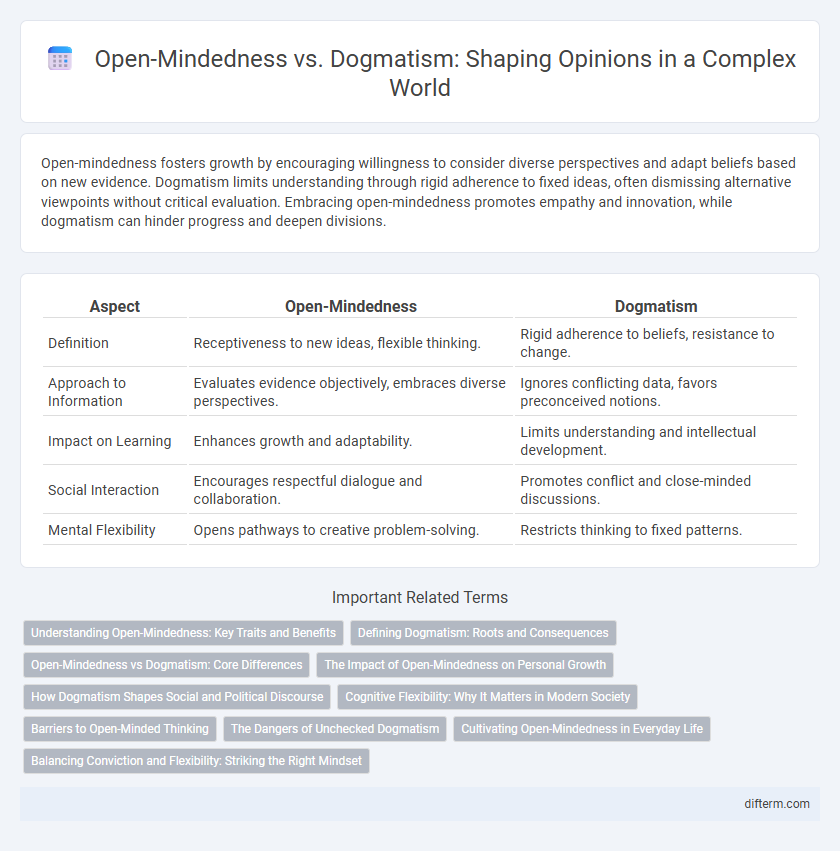Open-mindedness fosters growth by encouraging willingness to consider diverse perspectives and adapt beliefs based on new evidence. Dogmatism limits understanding through rigid adherence to fixed ideas, often dismissing alternative viewpoints without critical evaluation. Embracing open-mindedness promotes empathy and innovation, while dogmatism can hinder progress and deepen divisions.
Table of Comparison
| Aspect | Open-Mindedness | Dogmatism |
|---|---|---|
| Definition | Receptiveness to new ideas, flexible thinking. | Rigid adherence to beliefs, resistance to change. |
| Approach to Information | Evaluates evidence objectively, embraces diverse perspectives. | Ignores conflicting data, favors preconceived notions. |
| Impact on Learning | Enhances growth and adaptability. | Limits understanding and intellectual development. |
| Social Interaction | Encourages respectful dialogue and collaboration. | Promotes conflict and close-minded discussions. |
| Mental Flexibility | Opens pathways to creative problem-solving. | Restricts thinking to fixed patterns. |
Understanding Open-Mindedness: Key Traits and Benefits
Open-mindedness is characterized by a willingness to consider diverse perspectives and adapt beliefs based on new evidence, promoting intellectual flexibility and empathy. Key traits include curiosity, tolerance for ambiguity, and critical thinking, which enhance problem-solving abilities and foster constructive dialogue. Embracing open-mindedness leads to personal growth, improved relationships, and a more inclusive society by reducing prejudice and dogmatic rigidity.
Defining Dogmatism: Roots and Consequences
Dogmatism stems from rigid beliefs often rooted in cultural or personal experiences, limiting an individual's ability to consider alternative perspectives. This inflexibility hinders intellectual growth and fosters social polarization by rejecting diverse viewpoints. Ultimately, understanding the psychological and social origins of dogmatism is crucial for promoting open-mindedness and constructive dialogue.
Open-Mindedness vs Dogmatism: Core Differences
Open-mindedness encourages a willingness to consider diverse perspectives and adapt beliefs based on new evidence, promoting intellectual flexibility and growth. Dogmatism rigidly adheres to established beliefs, often dismissing contrary information and limiting critical thinking. This fundamental difference shapes how individuals process information, with open-mindedness fostering learning and collaboration, while dogmatism can lead to stagnation and conflict.
The Impact of Open-Mindedness on Personal Growth
Open-mindedness fosters personal growth by encouraging the exploration of diverse perspectives and the adaptation of new ideas, leading to enhanced critical thinking and emotional intelligence. This flexible mindset promotes lifelong learning and resilience, enabling individuals to navigate challenges with greater creativity and understanding. In contrast, dogmatism restricts cognitive expansion by enforcing rigid beliefs, thereby limiting opportunities for self-improvement and holistic development.
How Dogmatism Shapes Social and Political Discourse
Dogmatism entrenches rigid belief systems that hinder constructive dialogue and foster polarization within social and political discourse. This inflexibility often leads to the dismissal of opposing viewpoints, eroding critical thinking and democratic engagement. Consequently, dogmatic attitudes contribute to societal division by promoting intolerance and undermining collaborative problem-solving.
Cognitive Flexibility: Why It Matters in Modern Society
Cognitive flexibility enables individuals to adapt to rapidly changing environments by considering diverse perspectives and revising beliefs based on new information. This mental agility fosters open-mindedness, which is critical for innovation, problem-solving, and effective communication in today's interconnected world. In contrast, dogmatism restricts intellectual growth and collaboration, undermining social cohesion and progress.
Barriers to Open-Minded Thinking
Barriers to open-minded thinking often include cognitive biases such as confirmation bias, where individuals favor information that confirms their preexisting beliefs, limiting exposure to diverse perspectives. Emotional investment in personal ideologies can lead to dogmatism, causing resistance to new evidence or alternative viewpoints. Social pressures and cultural norms further reinforce rigid thinking by discouraging dissent and promoting conformity.
The Dangers of Unchecked Dogmatism
Unchecked dogmatism stifles critical thinking and perpetuates ignorance by refusing to consider alternative viewpoints or evidence. This rigid mindset fosters intolerance, social division, and the exclusion of diverse perspectives essential for societal progress. Open-mindedness, in contrast, encourages intellectual humility and adaptability, crucial for innovation and harmonious coexistence.
Cultivating Open-Mindedness in Everyday Life
Cultivating open-mindedness in everyday life involves actively seeking diverse perspectives and challenging personal biases to foster intellectual growth. Embracing curiosity and practicing empathetic listening enhance the ability to understand others' viewpoints, countering the rigidity of dogmatism. Regular reflection on one's beliefs and exposure to new experiences reinforce adaptability and critical thinking, essential traits for open-minded individuals.
Balancing Conviction and Flexibility: Striking the Right Mindset
Balancing conviction and flexibility requires embracing open-mindedness while maintaining core beliefs without rigid dogmatism. Open-minded individuals evaluate new information objectively, fostering intellectual growth and adaptability. Striking the right mindset involves confidently holding values yet remaining receptive to alternative perspectives, promoting informed decision-making and personal development.
open-mindedness vs dogmatism Infographic

 difterm.com
difterm.com